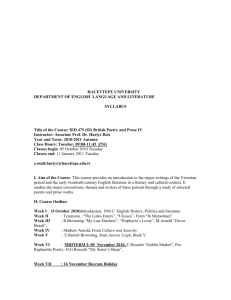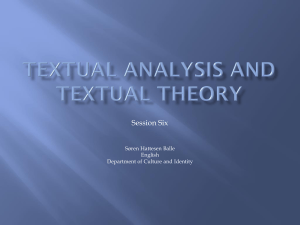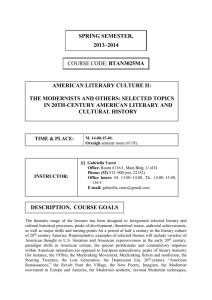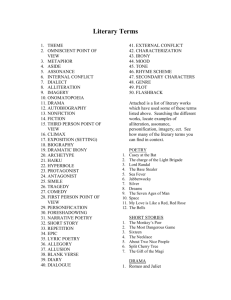New Intro Lit 10 Literature in Context
advertisement
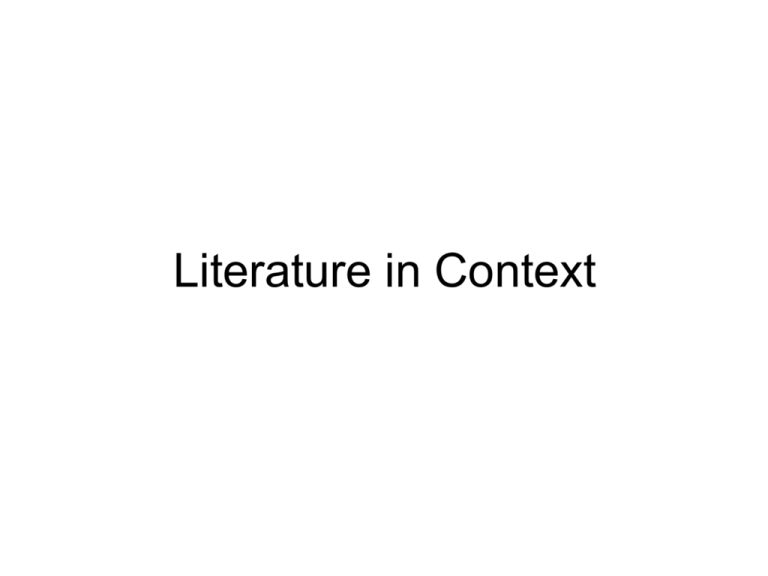
Literature in Context Lecture 10 Period Study Literary History Cultural Memory Postcolonial Studies Literatures in English Literature in Context Period Study, Literary History, Cultural Memory, Literatures in English, Postcolonial Studies, Literary Translation are interrelated notions or approaches to the study of literature. They are attempts at a scientific approach to literature, they propose related ways of a systematic study of literature and its phenomena. Literature in Context University curricula: based on literary kinds based on literary periods based on individual authors based on literary theories based on social context Literary Periods Dominant Qualities Defining literary periods: based on dominant qualities. Dominant qualities colour most elements of intellectual life in a given culture at a certain time – also influence art, music, architecture, landscape gardening, philosophy, politics, etc. • a few broad tendencies in common at a high level of abstraction • with individual, temporal, local variations • subordinate currents exist as well as dominant ones • declining and emergent energies e.g. New Historicism takes this line of study How to examine a literary period: how it is framed by a set of significant events The Renaissance in England, for example: • • • • the first visit of Erasmus (1499), Caxton's printing press at Westminster (1476), the discovery of America (1492), the court of the young Henry VIII (on the throne: 1491-1547), • the Protestant Reformation, • Copernicus's new astronomy (1543), • the reign of Elizabeth I (1558-1603) How to examine a literary period: priorities in its views • features certain priorities in its views concerning the world and art • e.g., in Classicism: balance, form, proportion, propriety (good taste, good manners correctness, otherwise known as decorum), dignity, simplicity, objectivity, rationality, restraint, responsibility (rather than self-expression), unity (rather than diversity) How to examine a literary period: views of humans, favourite genres • promotes a certain view of humankind e.g., in Romanticism: the celebration of the individual • uses specific genres (rather than others) e.g., in 19th c. Realism: the novel with its details, its particularisation of the lives of ordinary people How to examine a literary period: favourite subjects, favourite forms • favours certain subjects for art e.g., in Modernism: inner individual perception (impressionistic presentation, stream of consciousness technique, such as in Virginia Woolf's Mrs Dalloway) • shows characteristic formal elements (including the • example above) e.g., in Postmodernism: Narcissistic narrative: intruding into one's own fiction to ponder upon its powers A literary trend may not correspond exactly to a cultural period, e.g., Postmodernism and the Post-Modern Period. Literary period: horizontal or vertical study • The study of High Modernism • 1928 in literature in England in the historical context of the UK in the artistic or social or political context of continental Europe in the life of Virginia Woolf • The history of literature The history of literature history of literature: a series of literary periods connections may be established among texts (see “Leda and the Swan”) allusion, intertextuality: interdependence of texts through genre, conventions vs traditional notions of influence: study of direct sources How is literature read, or judged? Yet another way of looking at literature: how it was read, by whom, how it was judged • readership, horizon(s) of expectations (Hans Robert Jauss) • How do you judge a piece of literature? Do you have to? Should you? Can you avoid doing so? How do you select a work or period to be studied? Can evaluation change reading? Can evaluation prevent reading? • How are literary canons formed? • Literary canon – selection, exclusion, promotion Period Study. Literary History. "Dates and periods are necessary to the study and discussion of history, for historical phenomena are conditioned by time and are produced by the sequence of events. […] But, unlike dates, ‘periods’ are not facts. They are retrospective conceptions that we form about past events, useful to focus discussion, but very often leading historical thought astray.” G. M. Trevelyan: English Social History. Harmondsworth: Penguin Books (1942) 1970, 107 Literary Histories A few examples Michael Alexander: A History of English Literature. Third Edition. Houndmills: Palgrave Macmillan, 2013 Saintsbury, George: A Short History of English Literature. London: Macmillan, (1898) 1953 The Preliminaries of English Literature • The Earliest Anglo-Saxon Poetry • Caedmon, Cynewulf, and Those about Them • Angol-Saxon Prose • The Decadense of Anglo-Saxon The Making of English Literature • The Transition • First Middle English Period (1200-1250) • Second Middle English Period (1300-1360) • Early Romances – Metrical 5. Early Romances – Alliterative Saintsbury, cont. Chaucer and His Contemporaries 1. Chaucer’s Life and Poems 2. Langland and Gower 3. Chaucer’s Prose – Wyclif, Trevisa, Mandeville The Fifteenth Century 1. The English Chaucerians – Lydgate to Skelton 2. The Scottish Poets – Historical, Political, and Minor 3. The Four Great Scottish Poets (The King’s Quair, Henryson, Dunbar, Douglas) 4. Later Romances in Prose and Verse 5. Minor Poetry and Ballads 6. Miscellaneous Prose Saintsbury, cont. Elizabethan Literature to the Death of Spenser 1. Preliminaries – Drama 2. Preliminaries – Prose 3. Prelminaries – Verse 4. Spenser and His Contemporaries 5. The University Wits (Peele, Green, Marlowe, Kyd, Lodge, Nash) 6. Lyly and Hooker – The Translators, Pamphleteers and Critics Later Elizabethan and Jacobean Literature 1. Shakespeare 2. Shakespeare’s Contemporaries in Drama 3. The Schools of Jacobean Poetry 4. Jacobean Prose – Secular 5. The Golden Age of English Pulpit - I Saintsbury, cont. Caroline Literature 1. Blank Verse and the New Couplet 2. The Metaphysicals – The Lyric Poets – The Miscellansts, etc. 3. The Drama till the Closing of the THeatres 4. The Golden Age of the English Pulpit – II 5. Miscellanous Prose 6. Scots Poetry and Prose The Augustan Ages 1. The Age of Dryden – Poetry 2. The Age of Dryden – Drama 3. The Age of Dryden - Prose Saintsbury, cont. 4. 5. Queen Anne Prose (Swift, Steele, Addison, etc.) Pope and His Elder Contemporaries in Verse Middle and Later Eighteenth-Century Literature 1. The Poets from Thomson to Crabbe 2. The Eighteenth-Century Novel 3. Johnson, Goldsmith, and the Later Essayists 4. The Graver Prose 5. Eighteenth-Century Drama 6. Miscellaneous Writers The Triumph of Romance 1. The Poets from Coleridge to Keats Saintsbury, cont. 2. 3. 4. 5. The Novel – Scott and Miss Austen The New Essay (Lamb, Hunt, Hazlitt, De Quincey, etc.) The Last Georgian Prose The Minor Poets of 1800-1830 Victorian Literature 1. Tennyson and Browning 2. The Victorian Novel (Dickens, Thackeray, Charlotte Brontë, George Eliot, etc.) 3. History and Criticism (Carlyle, Ruskin, Arnold, Pater, etc.) 4. Poetry since the Middle of the Century 5. Miscellaneous (J. S. Mill, Darwin, etc.) Baugh, Albert C.: A Literary History of England. London: Routledge & Kegan Paul, 1948 Book I. The Middle Ages 1. The old English Period (to 1100) 2. The Middle English Period (1100-1500) Book II. The Renaissance 1. The Early Tudors (1485-1558) 2. The Reign of Elizabeth (1558-1603) 3. The Early Stuarts and The Commonwealth (1603-1660) Book III. The Restauration and Eighteenth Century (1660-1789) 1. The Rise of Classicism 2. Classicism and Journalism 3. The Disintegration of Classicism Book IV. The Nineteenth Century and After Dodsworth, Martin, ed.: The Penguin History of Literature. Harmondsworth: Penguin Books, (1970) 1994 1. 2. 3. 4. 5. 6. 7. [8. 9. The Middle Ages English Poetry and Prose 1540-1674 English Drama to 1710 Dryden to Johnson The Romantic Period The Victorians The Twentieth Century American Literature to 1900 American Literature since 1900] Ford, Boris, ed.: The New Pelican Guide to English Literature. Harmondsworth: Penguin Books, (1983) 1990 1. Medieval Literature Part One: Chaucer and the Alliterative Tradition Part Two: The European Inheritance 2. The Age of Shakespeare 3. From Donne to Marvell 4. From Dryden to Johnson 5. From Blake to Byron 6. From Dickens to Hardy 7. From James to Eliot 8. The Present [9. American Literature] Penguin Pelican Daiches, David: A Critical History of English Literature. 4 vols. London: Secker and Warburg, (1960) 1969 1. 2. From the Beginnings to the Sixteenth Century Shakespeare to Milton [Shakespeare Drama from Jonson to the Closing of the Theatres Milton Prose in the Sixteenth and Seventeenth Centuries Scottish Literature to 1700] 4. The Restoration to 1800 The Romantics to the Present Day + The Present Age in British Literature 3. (Bloomington, London: Indiana University Press, (1958) 1969 David Daiches Perkins, David: A History of Modern Poetry. From the 1890s to the High Modernist Mode. Cambridge, MA: Harvard University Press, 1976 1. Poetry around the Turn of the Century 2. Poetry in Rapport with a Public 3. Popular Modernism [The New Poetry of America Imagism Poetry for Democracy Conservative and Regional Poets of America Black Poets of America: The First Phase British Poetry after the War, 1918-1928] 4. The Beginnings of the High Modernist Mode Perkins, David: A History of Modern Poetry. Modernism and After. Cambridge, MA: Harvard University Press, 1987 1. The Age of High Modernism [The Ascendancy of T. S. Eliot, 1925-1950 Eliot’s Later Career Modes of Modern Style in the United States Hart Crane The Poetry of Critical Intelligence The Period Style of the 1930s in England W. H. Auden The English Romantic Revival] 1. 2. The Resurgence of Pound, Williams, and Stevens Postmodernism Period Studies Innes, Christopher: Modern British Drama 1890-1990. Cambridge: Cambridge University Press, 1992 Proceeds by a mixture of chronological, generic, cultural and theoretical features Bradbury, Malcolm: The Modern British Novel 1878 2001. London: Penguin Books, 2001 Proceeds by chronology, each decade a characteristic quality is attributed to Period Studies Childs, Peter: The Twentieth Century in Poetry. A Critical Survey. London and New York: Routledge, 1999 Proceeds by a mixture of chronological, generic, cultural and theoretical features. Period Studies Bradbury, Malcolm; McFarlane, James, eds.: Modernism. A Guide to European Literature 1890-1930. London: Penguin Books (1976) 1991 1. The Name and nature of Modernism 2. The Cultural and Intellectual Climate of Modernism 3. A Geography of Modernism 4. Literary Movements 5. The Lyric Poetry of Modernism 6. The Modernist Novel 7. Modernist Drama Histories of Genres Allen, Walter: The English Novel. Harmondsworth: Penguin Books (1954) 1958 Grierson, Herbert J. C.; Smith, J. C.: A Critical History of English Poetry. New Jersey: Humanities Press, London: Athlone Press (1944) 1983 Cultural Memory How we create an image of the past, How we make sense of our past from our present, How we understand ourselves and our past, What stories we tell to ourselves about ourselves, What we choose to remember or forget, How we explain the reasons why we remember or forget something, How we make sure that we hand over the memories that matter to us Cultural Memory as a Concept • Introduced to the archaeological disciplines by Jan Assmann Assman’s definition: the "outer dimension of human memory" • "memory culture“ (Erinnerungskultur) • "reference to the past“ (Vergangenheitsbezug) https://tspace.library.utoronto.ca/citd/holtorf/2.0.html Cultural Memory See: http://en.wikipedia.org/wiki/Cultural_memory As a term, cultural memory was first introduced by the German Egyptologists Jan Assmann in his book Das kulturelle Gedächtnis (1992). Assmann and fellow scholars have identified a general interest in memory and mnemonics since the early 1980s, illustrated by phenomena as diverse as memorials and retro-culture. Some might see cultural memory as becoming more democratic, due to liberalization and the rise of new media. Others see cultural memory as remaining concentrated in the hands of corporations and states. Cultural Memory See: http://en.wikipedia.org/wiki/Cultural_memory Because memory is not just an individual, private experience but is also part of the collective domain, cultural memory has become a topic in both historiography and cultural studies. These emphasize cultural memory’s process (historiography) and its implications and objects (cultural studies), respectively. Memory is a phenomenon that is directly related to the present; our perception of the past is always influenced by the present, which means that it is always changing. Cultural Memory Historiographical approach See: http://en.wikipedia.org/wiki/Cultural_memory Crucial in understanding cultural memory as a phenomenon is the distinction between memory and history. This distinction was put forward by Pierre Nora, who pinpointed a niche in-between history and memory. Simply put, memories are the events that actually happened, while histories are subjective representations of what historians believe is crucial to remember. This dichotomy, it should be noted, emerged at a particular moment in history: it implies that there used to be a time when memories could exist as such — without being representational. Cultural Memory Historiographical approach See: http://en.wikipedia.org/wiki/Cultural_memory Scholars disagree as to when to locate the moment representation 'took over'. Nora points to the formation of European nation states. For Richard Terdiman, the French revolution is the breaking point: the change of a political system, together with the emergence of industrialization and urbanization, made life more complex than ever before. This not only resulted in an increasing difficulty for people to understand the new society in which they were living, but also, as this break was so radical, people had trouble relating to the past before the revolution. In this situation, people no longer had an implicit understanding of their past. Cultural Memory Historiographical approach See: http://en.wikipedia.org/wiki/Cultural_memory In order to understand the past, it had to be represented through history. As people realized that history was only one version of the past, they became more and more concerned with their own cultural heritage (in French called patrimoine) which helped them shape a collective and national identity. Cultural Memory Historiographical approach See: http://en.wikipedia.org/wiki/Cultural_memory In search for an identity to bind a country or people together, governments have constructed collective memories in the form of commemorations which should bring and keep together minority groups and individuals with conflicting agendas. The obsession with memory coincides with the fear of forgetting and the aim for authenticity. Cultural Memory Historiographical approach See: http://en.wikipedia.org/wiki/Cultural_memory However, more recently questions have arisen whether there ever was a time in which 'pure', nonrepresentational memory existed. Representation is a crucial precondition for human perception in general: pure, organic and objective memories can never be witnessed as such. Cultural Memory In an oral tradition, all cultural representations are easily remembered ones; hard-to-remember representations are forgotten, or transformed into more easily remembered ones, before reaching a cultural level of distribution. Sperber, Dan: Explaining Culture. A Naturalistic Approach. Malden, MSA: Blackwell, 1996, 74 Cultural Memory Cultural Studies approach See: http://en.wikipedia.org/wiki/Cultural_memory Recently, interest has developed in the area of 'embodied memory'. The body can be seen as a container, or carrier of memory. Memory can be contained in objects. Souvenirs and photographs inhabit an important place in the cultural memory discourse. Cultural Memory Cultural Studies approach See: http://en.wikipedia.org/wiki/Cultural_memory Another practice that has a specific relationship with memory is photography. The act of taking a picture can underline the importance of remembering, both individually and collectively. Pictures cannot only stimulate or help memory, but can rather eclipse the actual memory – when we remember in terms of the photograph – or they can serve as a reminder of our propensity to forget. Cultural Memory Between Culture and Memory: Experience See: http://en.wikipedia.org/wiki/Cultural_memory The rise of gender and postcolonial studies underscored the importance of the individual and particular memories of those unheard in most collective accounts: women, minorities, homosexuals, etc. Experience, whether it be lived or imagined, relates mutually to culture and memory. It is influenced by both factors, but determines these at the same time. Cultural Memory Between Culture and Memory: Experience See: http://en.wikipedia.org/wiki/Cultural_memory Culture influences experience by offering mediated perceptions that affect it. In turn, experience affects culture, since individual experience becomes communicable and therefore collective. A memorial, for example, can represent a shared sense of loss. Experience is substantial to the interpretation of culture as well as memory, and vice versa. Dublin General Post Office The Death of Cuchulain (1911) by Oliver Sheppard Cultural Memory Assmann, Jan: Das Kulturelle Gedächtnis: Schrift, Erinnerung und Politische Identität in frühen Hochkulturen. Munich: Verlag C.H. Beck, 1992 Nora, Pierre: 'Between Memory and History: Les Lieux de Mémoire'. Representations, 26, 1989, 7–25. “Memory Culture” The way a society ensures cultural continuity by preserving, with the help of cultural mnemonics, its collective knowledge from one generation to the next, rendering it possible for later generations to reconstruct their cultural identity. https://tspace.library.utoronto.ca/citd/holtorf/2.0.html “Reference to the Past” • Reassure the members of a society of their collective identity and supply them with an awareness of their unity and singularity in time and space—i.e., an historical consciousness— by creating a shared past • It can involve rituals and ceremonies at special occasions such as commemoration days, and at special places such as ancient monuments, which function as timemarks and sites of memory https://tspace.library.utoronto.ca/citd/holtorf/2.0.html Forms of Cultural Memory Formal – institutional – private – personal • History • Schools, subjects, syllabi, exams • Religion • Holidays (public, national, religious, private rituals) • Anecdotes • Memories • Controversial, minority views, counter-narratives Cultural Memory and Literature Literary works – popular, canonical History of literature - of a language - of a nation Representation of a literature or culture in another literature or culture: stereotypes popular images history of their literature Cultural memory at DES, SEAS British Literature in the Hungarian Cultural Memory project at the Department of English Studies, dir. Prof. Ágnes Péter Cultural Memory and Literature An international conference (24–25 Sept, 2010) http://kulturalisemlekezet.blogspot.com/ Cultural memory resources Cultural Memory, Collective Memory sites Brief introduction to names and concepts: http://www.collectivememory.net/2009/12/culturalmemory-and-communicative.html Up to date academic info on projects and conferences: http://www.collectivememory.net/ Definition with interpretation and sources before 2000: https://tspace.library.utoronto.ca/citd/holtorf/2.0.html Cultural Memory Texts Jan Assmann, “Collective Memory and Cultural Identity” Collective Memory and Cultural Identity - JStor www.jstor.org/stable/488538 Recent publications: Cultural Memory Studies: An International and Interdisciplinary Handbook. Astrid Erll, Ansgar Nunning eds. Berlin: Walter de Gruyter, 2008 Series: Cultural Memory in the Present ed. Mieke Bal and Hent de Vries, Stanford UP http://www.sup.org/browse.cgi?x=series&y=Cultural%2 0Memory%20in%20the%20Present Studying Cultural Memory Center for the Study of Cultural Memory at the University of London http://www.igrs.sas.ac.uk/centre-study-culturalmemory University of Brighton http://arts.brighton.ac.uk/study/postgrad/culturalhistory-memory-identity-ma The Centre for Bible and Cultural Memory, Faculty of Theology, Copenhagen: http://www.teol.ku.dk/english/dept/bicum/ Literatures in English Postcolonial Studies • explores the various facets—textual, figural, spatial, historical, political and economic—of the colonial encounter, and the ways in which this encounter shaped the West and non-West alike • investigations from many disciplines, as well as a theoretical perspective from which to view a variety of concerns http://www.tandf.co.uk/journals/titles/13688790.asp Literatures in English English literary texts representing other cultures – the living conscience and public depository of the cultural memories of the world, telling the story, incorporating the way of thinking, and mirroring the language of other cultures. Some examples V. S. Naipaul: A Bend in the River (1979), narrated by an Indian Muslim in an unnamed African country after independence, observing the rapid changes in his homeland with an outsider's distance. Salman Rushdie: Midnight's Children (1981), key events in the history of India. Kazuo Ishiguro: A Pale View Hills (1982), narrated by a Japanese widow living in England. Tibor Fischer: Under the Frog (1992), the 1950s and 1956 in Hungary. Some more examples R. K. Narayan: The Guide (1958), a novel based in Malgudi, the fictional town in South India. The novel describes the transformation of the protagonist, Raju from a tour guide to a spiritual guide and become one of the greatest holy man of India. Derek Walcott: Omeros (1990), an epic poem set on the Caribbean island of St. Lucia, drawing on Homer, Virgil, and Dante, presenting themes such as colonialism, historiography, homecoming, paternity. Derek Walcott (1930) Salman Rushdie (1947) Kazuo Ishiguro (1954) Postcolonial Studies See: http://en.wikipedia.org/wiki/Postcolonialism Post-colonialism (postcolonial theory, post-colonial theory) is an intellectual discourse that consists of reactions to, and analysis of, the cultural legacy of colonialis. Postcolonialism comprises a set of theories found amongst anthropology, architecture, philosophy, film, political science, human geography, sociology, feminism, religious and theological studies, and literature. Postcolonial Studies See: http://en.wikipedia.org/wiki/Postcolonialism The ultimate goal of post-colonialism is accounting for and combating the residual effects of colonialism on cultures. It is not simply concerned with salvaging past worlds, but learning how the world can move beyond this period together, towards a place of mutual respect. Postcolonial Studies See: http://en.wikipedia.org/wiki/Postcolonialism Post-colonialist theorists recognize that many of the assumptions which underlie the "logic" of colonialism are still active forces today. Exposing and deconstructing the racist, imperialist nature of these assumptions will remove their power of persuasion and coercion. Postcolonial Studies See: http://en.wikipedia.org/wiki/Postcolonialism A key goal of post-colonial theorists is clearing space for multiple voices. This is especially true of those voices that have been previously silenced by dominant ideologies – subalterns. Edward Said, in his book Orientalism, provides a clear picture of the ways social scientists, specifically Orientalists, can disregard the views of those they actually study – preferring instead to rely on the intellectual superiority of themselves and their peers. Postcolonial Studies See: http://en.wikipedia.org/wiki/Postcolonialism Postcolonialism as a literary theory (with a critical approach), deals with literature produced in countries that once were colonies of other countries. Colonized people, especially of the British Empire, attended British universities and with their access to education, created this new criticism. Following the breakup of the Soviet Union during the late 20th century, its former republics became the subject of this study as well. Postcolonial Studies See: http://en.wikipedia.org/wiki/Postcolonialism Postcolonial theory provides a framework that destabilizes dominant discourses in the West, challenges inherent assumptions, and critiques the legacies of colonialism. Postcolonial Studies See: http://en.wikipedia.org/wiki/Postcolonialism Postcolonialism deals with cultural identity in colonized societies: the dilemmas of developing a national identity after colonial rule; • the ways in which writers articulate and celebrate that identity; • the ways in which the knowledge of the colonized (subordinated) people has been generated and used to serve the colonizer's interests; • the ways in which the colonizer's literature has justified colonialism via images of the colonised as a perpetually inferior people, society and culture. Postcolonial Studies See: http://en.wikipedia.org/wiki/Postcolonialism Founding works on postcolonialism • Edward Said: Orientalism (1978) • Edward W. Said, Culture and Imperialism (1993) • Gayatri Chakravorty Spivak, Can the Subaltern Speak? (1988) • Gayatri Chakravorty Spivak: The Postcolonial Critic (1990) • Homi Bhabha: The Location of Culture (1994) • Declan Kiberd: Inventing Ireland (1995) Charles Tennyson Turner (1808-1879) LETTY’S GLOBE When Letty had scarce pass'd her third glad year, And her young artless words began to flow, One day we gave the child a colour'd sphere Of the wide earth, that she might mark and know, By tint and outline, all its sea and land. She patted all the world; old empires peep'd Between her baby fingers; her soft hand Was welcome at all frontiers. How she leap'd, And laugh'd and prattled in her world-wide bliss; But when we turn'd her sweet unlearned eye On our own isle, she raised a joyous cry-'Oh! yes, I see it, Letty's home is there!' And while she hid all England with a kiss, Bright over Europe fell her golden hair. Charles Tennyson Turner (1808-1879) Letty’s Globe When Letty had scarce pass'd her third glad year, And her young artless words began to flow, One day we gave the child a colour'd sphere Of the wide earth, that she might mark and know, By tint and outline, all its sea and land. She patted all the world; old empires peep'd Between her baby fingers; her soft hand Was welcome at all frontiers. How she leap'd, And laugh'd and prattled in her world-wide bliss; But when we turn'd her sweet unlearned eye On our own isle, she raised a joyous cry 'Oh! yes, I see it, Letty's home is there!' And while she hid all England with a kiss, Bright over Europe fell her golden hair. Victorian Terrestrial Globes Victorian Terrestrial Globe Map of the British Empire, 1886 Map of the British Empire, 1922 RUDYARD KIPLING (1865-1936) George Orwell called Kipling a "prophet of British imperialism". He had the reputation as the ‘Poet of the Empire’. The poem concerns the signing of the Ulster Covenant in 1912. The Ulster Covenant was signed by just under half a million men and women from Ulster, on and before 28 September 1912, in protest against the Third Home Rule Bill, introduced by the British Government in that same year. The signatories were all against the establishment of a Home Rule parliament in Dublin. ULSTER 1912 The dark eleventh hour Draws on and sees us sold To every evil power We fought against of old. Rebellion, rapine hate Oppression, wrong and greed Are loosed to rule our fate, By England's act and deed. The blood our fathers spilt, Our love, our toils, our pains, Are counted us for guilt, And only bind our chains. Before an Empire's eyes The traitor claims his price. What need of further lies? We are the sacrifice. ULSTER 1912 We asked no more than leave To reap where we had sown, Through good and ill to cleave To our own flag and throne. Now England's shot and steel Beneath that flag must show How loyal hearts should kneel To England's oldest foe. Ulster 1912 The residents of Ulster, the northernmost province of Ireland, desired to keep their province part of the United Kingdom. By the late 19th century "Home Rule" was the idea de rigueur – it would give the Irish a devolved Parliament in Dublin to devise legislation for their own affairs, but they would be part of the British Empire. There were critics of this plan who felt that Home Rule was too close to an independent Ireland. Furthermore, as mostly Protestant, they feared the dominance of the rural, catholic South of Ireland over the northern part. Thomas Osborne Davis (1814–1845) was a revolutionary Irish writer who was the chief organiser and poet of the Young Ireland movement. A NATION ONCE AGAIN When boyhood's fire was in my blood I read of ancient freemen, For Greece and Rome who bravely stood, Three hundred men and three men; And then I prayed I yet might see Our fetters rent in twain, And Ireland, long a province, be. A Nation once again! A Nation once again, A Nation once again, And lreland, long a province, be A Nation once again!




